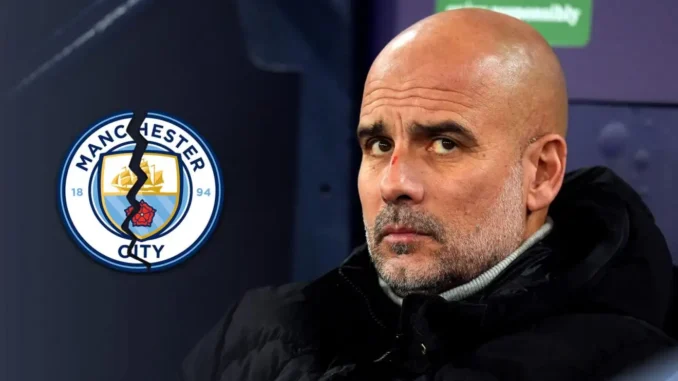
The intricate tapestry of football management, often woven with threads of strategy, ambition, and loyalty, has been thrown into disarray by reports suggesting a rift between Pep Guardiola and Manchester City. The narrative that has emerged paints a picture of a manager feeling constrained, even coerced, into a contract extension he allegedly did not desire, fueling speculation about his potential departure.
The story centers around the renewal of Guardiola’s contract, a development that was initially hailed as a sign of continued stability and ambition at the Etihad Stadium. However, behind the veneer of official announcements and public appearances, a different narrative has surfaced. Whispers within the footballing community suggest that the extension was not a reflection of Guardiola’s unbridled enthusiasm, but rather a product of external pressures and a sense of obligation.
The crux of the matter lies in the assertion that Guardiola felt “forced” into signing the new deal. The implication is that factors beyond his control, perhaps related to the club’s long-term strategy, financial considerations, or even personal relationships, played a decisive role in his decision. This notion of coercion, however subtle, has cast a shadow over his commitment to the club.
“He felt like he had no other option,” a source close to the situation reportedly suggested. “It wasn’t a matter of him not wanting to stay, but more about the circumstances surrounding the renewal.”
These circumstances, according to those familiar with the situation, created an environment where Guardiola felt his autonomy was compromised. The manager, known for his meticulous planning and unwavering control, reportedly felt that certain decisions were being made without his full input or consent.
The suggestion that Guardiola “wants to leave” stems from this perceived loss of control and the feeling that his vision for the club is not being fully realized. The manager, a perfectionist with a relentless drive for success, is said to be frustrated by the limitations placed upon him.
“He’s a man who demands complete control,” one football pundit explained. “If he feels that he’s not being allowed to implement his ideas, it’s only natural that he would consider his options.”
The timing of these reports has also added fuel to the fire. With the club facing ongoing scrutiny regarding financial regulations, some speculate that Guardiola’s contract extension was seen as a way to project an image of stability and continuity, regardless of his personal feelings.
The impact of Guardiola’s potential departure would be seismic. He is widely regarded as one of the greatest managers of his generation, and his influence on Manchester City has been transformative. His departure would not only create a void on the touchline, but also raise questions about the club’s future direction.
The players, who have thrived under Guardiola’s tutelage, would also be affected. His tactical brilliance and his ability to motivate players have been instrumental in the club’s success. The uncertainty surrounding his future could create a sense of unease within the squad.
The fans, who have witnessed unprecedented success under Guardiola, would also be deeply disappointed. He has become a symbol of the club’s ambition and its commitment to playing attacking, attractive football.
The situation has also reignited discussions about the power dynamics between managers and club owners. In an era of increasing commercialization and financial investment, managers are often seen as employees, subject to the decisions of those who hold the purse strings.
The idea that a manager of Guardiola’s stature could feel “forced” into a contract extension has raised concerns about the erosion of managerial autonomy. Some argue that managers should have greater control over their own destinies, and that they should not be subject to undue pressure from club owners.
The reports also highlight the challenges of managing at the highest level of football. The constant pressure to win, the scrutiny from the media, and the demands of club owners can create a stressful and challenging environment.
The narrative surrounding Guardiola’s potential departure is still developing. It remains to be seen whether the reports are accurate, and whether the manager will ultimately decide to leave Manchester City. However, the speculation itself has created a sense of unease and uncertainty, casting a shadow over the club’s future. The world of football now waits, with bated breath, to see how this drama will unfold.
Leave a Reply